Protokoll eines Verschwindens
Der Fotograf Pasha Kritchko dokumentierte die Proteste in Belarus, wurde vom Regime verfolgt und ins Exil gezwungen. Seine Bilder erzählen von Gewalt und Hoffnung – und vom Versuch, Erinnerung und Identität im Exil zu bewahren. Von Pasha Kritchko (Fotos) und Ludwig Nikulski (Protokoll)
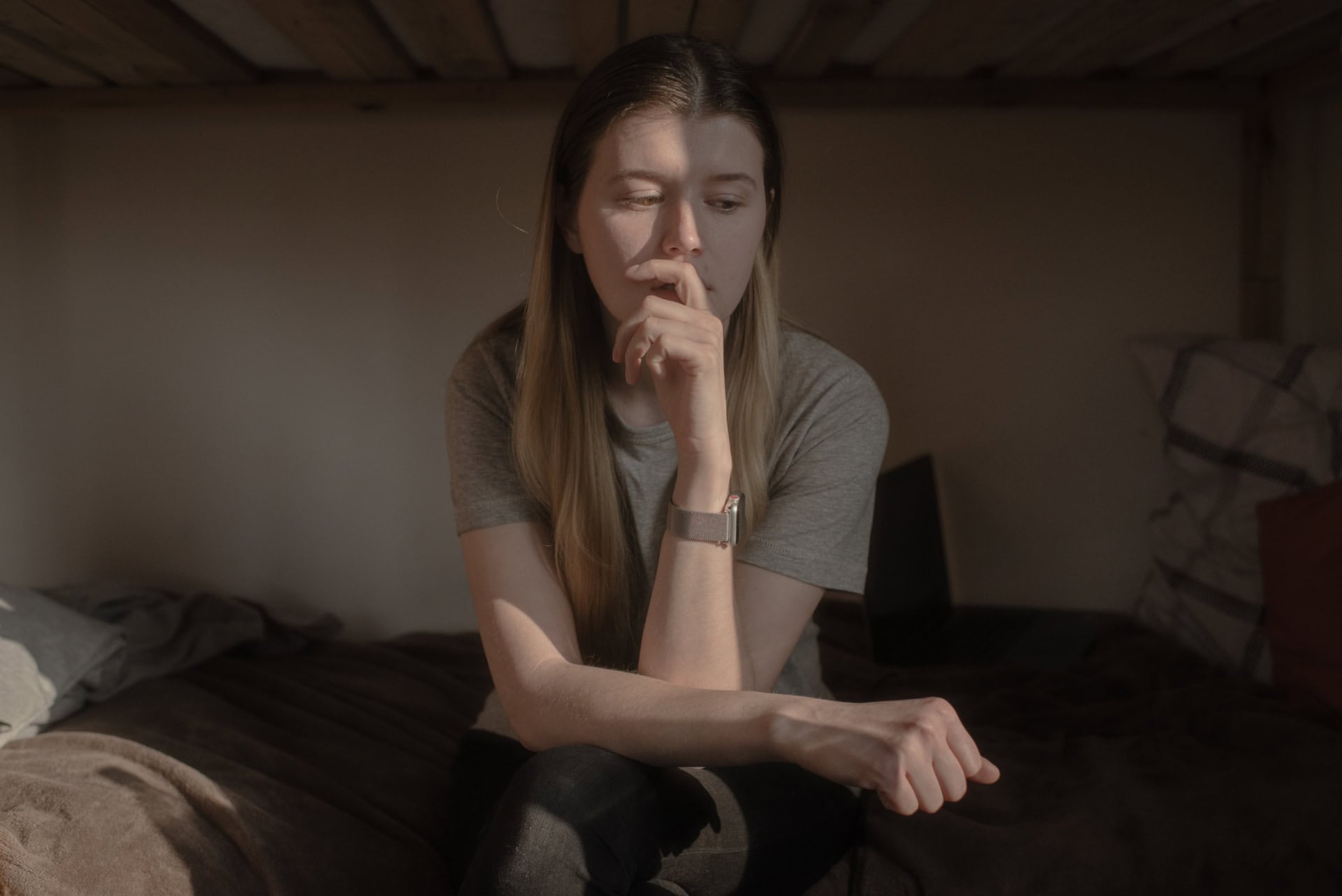
Es war Sommer 2021, als ich verhaftet wurde. Ich tat nichts Dramatisches. Ich stand einfach vor dem Gerichtsgebäude in Minsk mit einer Kamera in der Hand. Es war der letzte Tag im Prozess gegen Wiktar Babaryka, einen ehemaligen Banker, der es gewagt hatte, 2020 für das Präsidentenamt zu kandidieren. Er war auch derjenige, dessen Kampagne ich begleitete um zu dokumentieren, was im Land geschah. An diesem Tag war ich der einzige unabhängige Fotograf vor dem Gericht. Schon das machte mich verdächtig.
Ich hatte ein ungutes Gefühl. Ein silberner Van erschien auf dem Platz und näherte sich langsam. Ich ging schnell los, betrat das Gerichtsgebäude durch den Haupteingang, rannte die Treppen hoch in der Hoffnung, verschwinden zu können. Aber der Notausgang war verschlossen. Ich schaffte es bis in den vierten Stock, das Gebäude fühlte sich seltsam leer an. In einer kleinen Küche ohne Fenster, ohne Kaffeeduft, ohne Spuren von Leben löschte ich das Licht und setzte mich in die Ecke. Als der Polizist die Tür öffnete, sah er mich zunächst nicht. Dann ging das Licht an. «Objekt gefunden», sagte er.
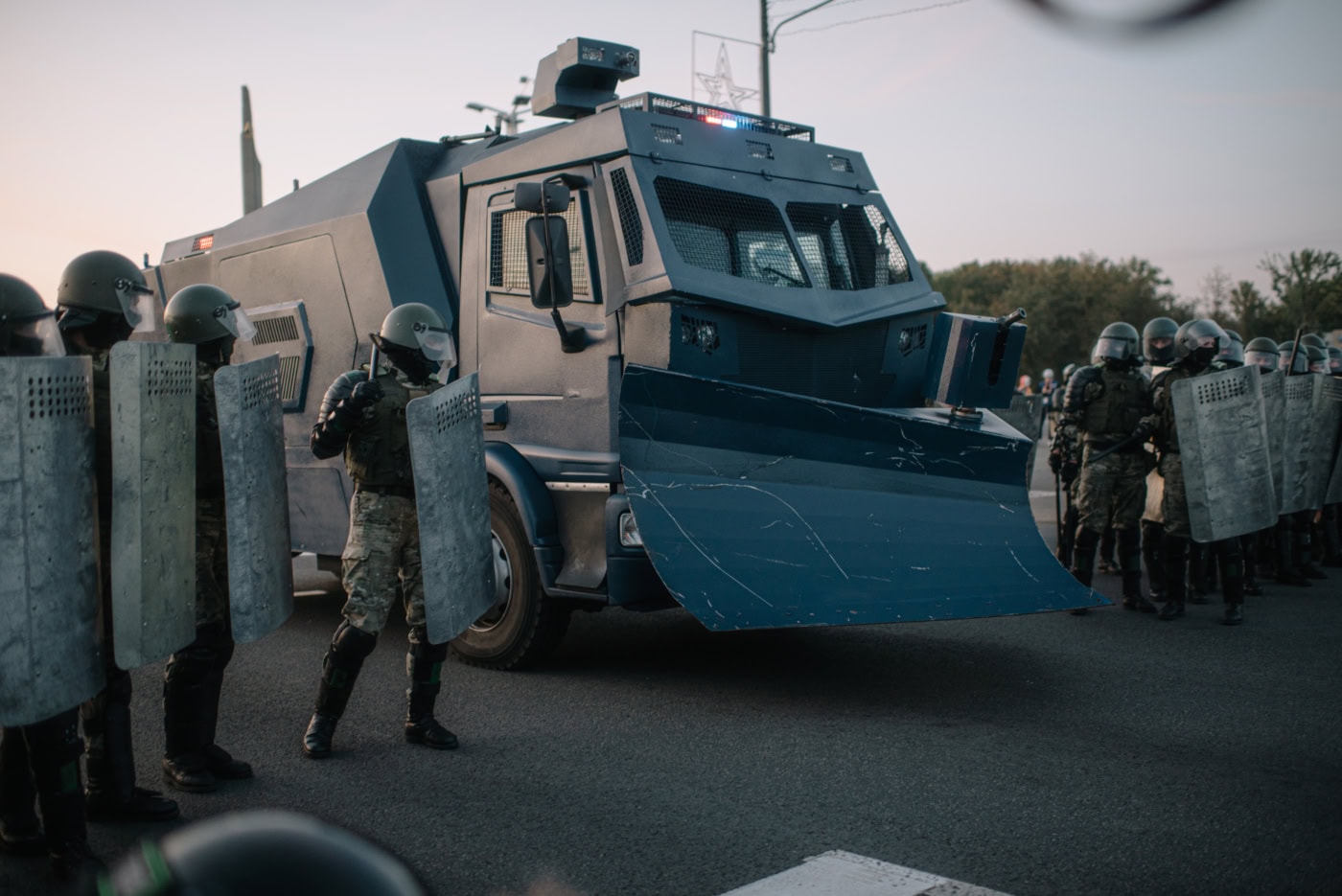 Riot police disperse a protest against Lukashenko on the day of the secret inauguration on September 23, 2020, in Minsk.
Riot police in Belarus are known for their brutal tactics, frequently using excessive force to disperse anti-government protests. On this day, water cannons, tear gas, and rubber bullets were employed to suppress demonstrators. Thousands of protesters were detained throughout the country following the 2020 presidential election, which was widely criticized as fraudulent. Human rights organizations documented numerous cases of police violence, including beatings and torture of detainees in facilities such as the Okrestina detention center.
Riot police disperse a protest against Lukashenko on the day of the secret inauguration on September 23, 2020, in Minsk.
Riot police in Belarus are known for their brutal tactics, frequently using excessive force to disperse anti-government protests. On this day, water cannons, tear gas, and rubber bullets were employed to suppress demonstrators. Thousands of protesters were detained throughout the country following the 2020 presidential election, which was widely criticized as fraudulent. Human rights organizations documented numerous cases of police violence, including beatings and torture of detainees in facilities such as the Okrestina detention center.
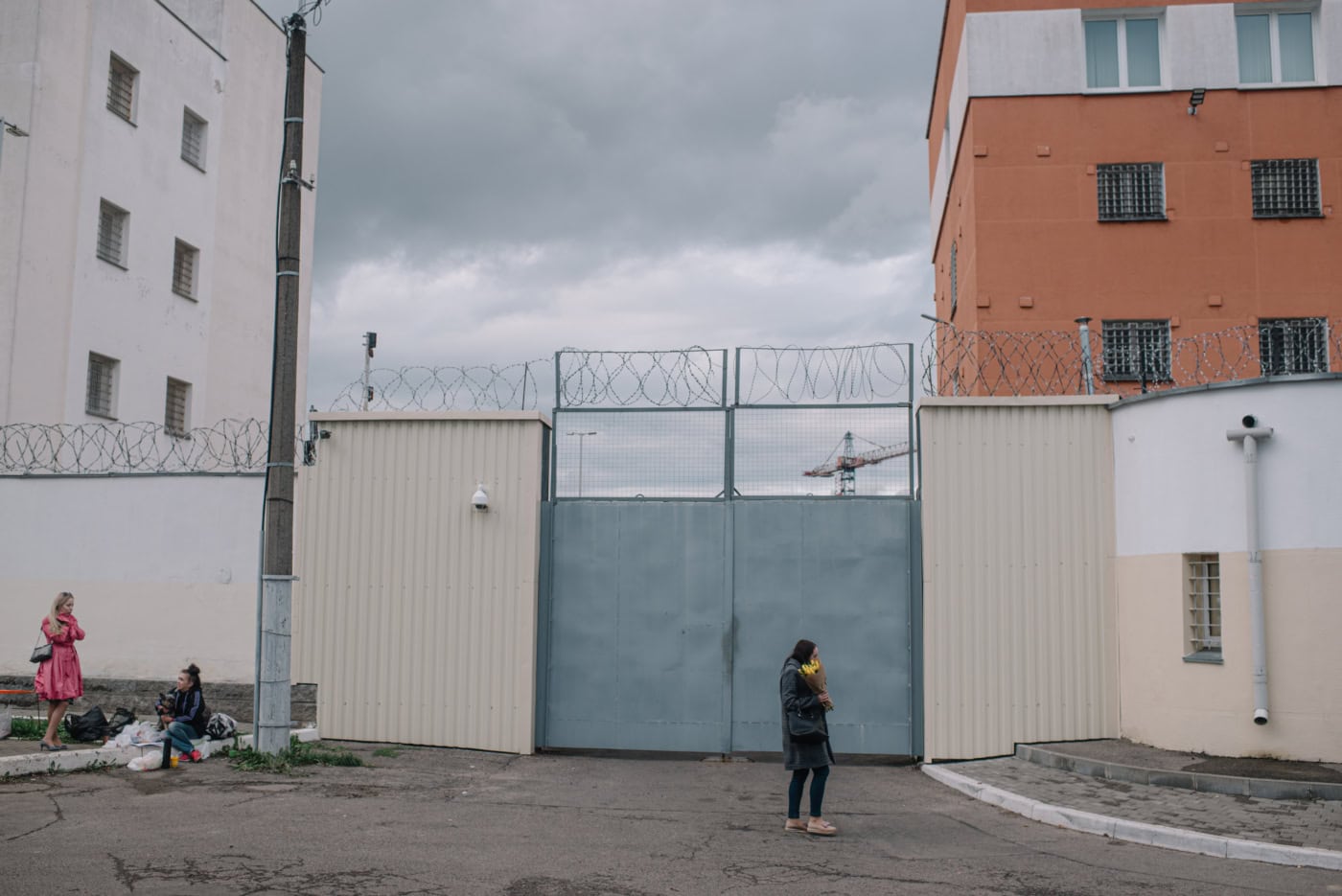 A woman with flowers waits near the gate of the Okrestina detention center in Minsk, Belarus for the release of famous basketball player Elena Leuchanka after 15 days of detention on 15 October 2020.
Okrestina is notorious as a detention center for Belarusian opposition activists arrested during mass protests against President Alexander Lukashenko's regime. During the 2020 protests, numerous reports emerged of detainees being tortured in Okrestina. Many were beaten, with some suffering severe injuries. At least three detainees endured injuries indicative of sexual violence, including anal fissures, bleeding, and damage to the rectum, with victims requiring hospitalization for their injuries.
A woman with flowers waits near the gate of the Okrestina detention center in Minsk, Belarus for the release of famous basketball player Elena Leuchanka after 15 days of detention on 15 October 2020.
Okrestina is notorious as a detention center for Belarusian opposition activists arrested during mass protests against President Alexander Lukashenko's regime. During the 2020 protests, numerous reports emerged of detainees being tortured in Okrestina. Many were beaten, with some suffering severe injuries. At least three detainees endured injuries indicative of sexual violence, including anal fissures, bleeding, and damage to the rectum, with victims requiring hospitalization for their injuries.
Die Kampagne von Wiktar Babaryka gab mir eine unerwartete Chance: Ich durfte ihn begleiten, fotografieren, ganz nah dran sein.
Im Jahr 2020 war ich noch kein politischer Fotograf. Ich arbeitete kommerziell – Hochzeiten, Events, Firmenkunden. Doch dann kam die Pandemie, und die Aufträge brachen weg. Gleichzeitig regte sich etwas Größeres in Belarus. Die Präsidentschaftswahl löste ein landesweites Erwachen – und eine brutale Repression – aus. Ich spürte den Drang, nützlich zu sein. Nicht durch Parolen, sondern durch Dokumentation. Ich hatte eine Kamera. Das schien genug.
Die Kampagne von Wiktar Babaryka gab mir eine unerwartete Chance: Ich durfte ihn begleiten, fotografieren, ganz nah dran sein. Ich half sogar beim Sammeln von Unterschriften für seine Kandidatur – aber bald wurde mir klar, dass ich als Fotograf mehr beitragen konnte als als Aktivist. Was als bürgerliches Engagement begann, wurde schnell historisch und gefährlich. Nach wenigen Wochen wurde Wiktar verhaftet. Auch sein Sohn kam ins Gefängnis. Später folgten die Kampagnenleiterin Maryja Kalesnikawa und der Anwalt Maksim Znak.
Wir alle hielten uns an die Gesetze. Wir wollten keine Revolution, sondern zeigen, was wirklich geschah. Aber genau das reichte offenbar, um uns zu kriminalisieren.
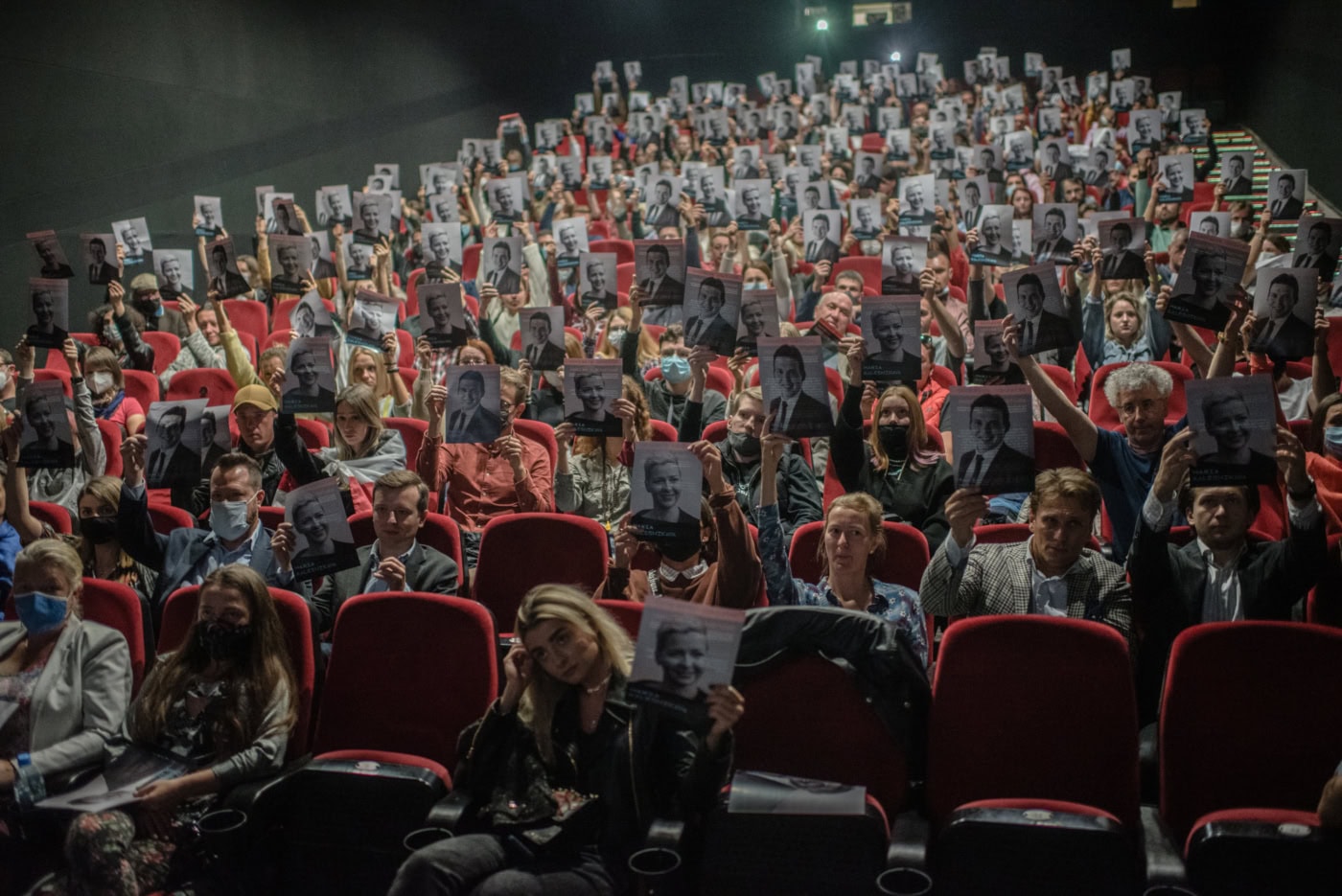 A screening of Aliaksey Paluyan's film Courage in Warsaw, Poland, on 7 September 2021, was dedicated to commemorating the anniversary of the arrest of political leader Maria Kalesnikava and lawyer Maksim Znak.
The event was organized in coordination with Tatyana Khomich, Maria Kalesnikava’s sister, who continues to fight for the release of her sister and thousands of other political prisoners in Belarus. Tatyana is actively participating in global initiatives to raise awareness of their cases. As of December 2024, 1,446 individuals are recognized as political prisoners in Belarus. Among them are prominent figures like Kalesnikava, Siarhei Tikhanouski, Ihar Losik, and Ales Bialiatski. These prisoners are often held incommunicado, without contact with their families or lawyers, enduring harsh conditions and facing long sentences for their political activism.
A screening of Aliaksey Paluyan's film Courage in Warsaw, Poland, on 7 September 2021, was dedicated to commemorating the anniversary of the arrest of political leader Maria Kalesnikava and lawyer Maksim Znak.
The event was organized in coordination with Tatyana Khomich, Maria Kalesnikava’s sister, who continues to fight for the release of her sister and thousands of other political prisoners in Belarus. Tatyana is actively participating in global initiatives to raise awareness of their cases. As of December 2024, 1,446 individuals are recognized as political prisoners in Belarus. Among them are prominent figures like Kalesnikava, Siarhei Tikhanouski, Ihar Losik, and Ales Bialiatski. These prisoners are often held incommunicado, without contact with their families or lawyers, enduring harsh conditions and facing long sentences for their political activism.
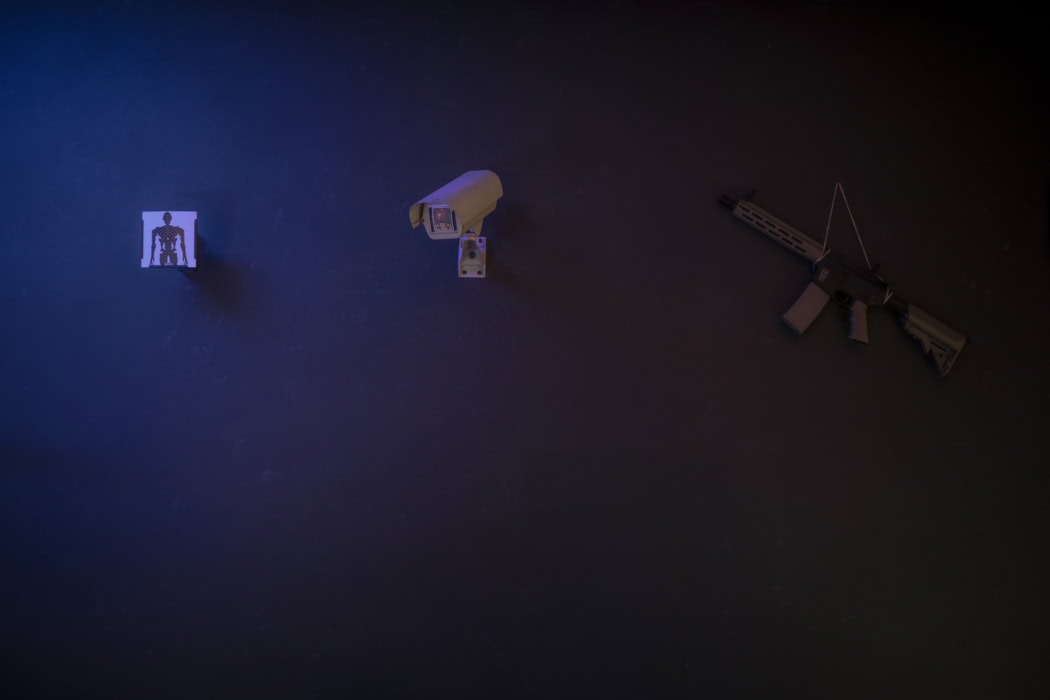 Belarusian space "Hackerspace" in Poznań, Poland. January 20, 2025.
Belarusian space "Hackerspace" in Poznań, Poland. January 20, 2025.
Als ich im Juli 2021 festgenommen wurde, war der Angriff auf unabhängige Medien längst im vollen Gange. Man verhörte mich wegen «Extremismus», fragte mich nach Faschismus, durchsuchte mein Telefon, wollte mich einschüchtern. Ich hatte nicht vor zu fliehen, ich habe nicht viel darüber nachgedacht und wollte so lange wie möglich im Land bleiben. Ich suchte nach Wegen, mit der Angst umzugehen und einen Sinn zu finden, etwas, das ich als Fotograf tun kann.
In den folgenden Wochen wuchs das Gefühl von Unsicherheit. Am 8. Juli wurden in ganz Belarus Wohnungen von Dutzenden Journalist*innen durchsucht, einige wurden verhaftet. Ich konnte meine Fotos retten und veröffentlichte sie online. Manche Kolleg*innen kritisierten das – sie befürchteten, die Regierung würde daraus lernen, wie man gelöschte Dateien wiederherstellt. Aber ich wollte nicht schweigen. Irgendwie wollte ich laut sein.
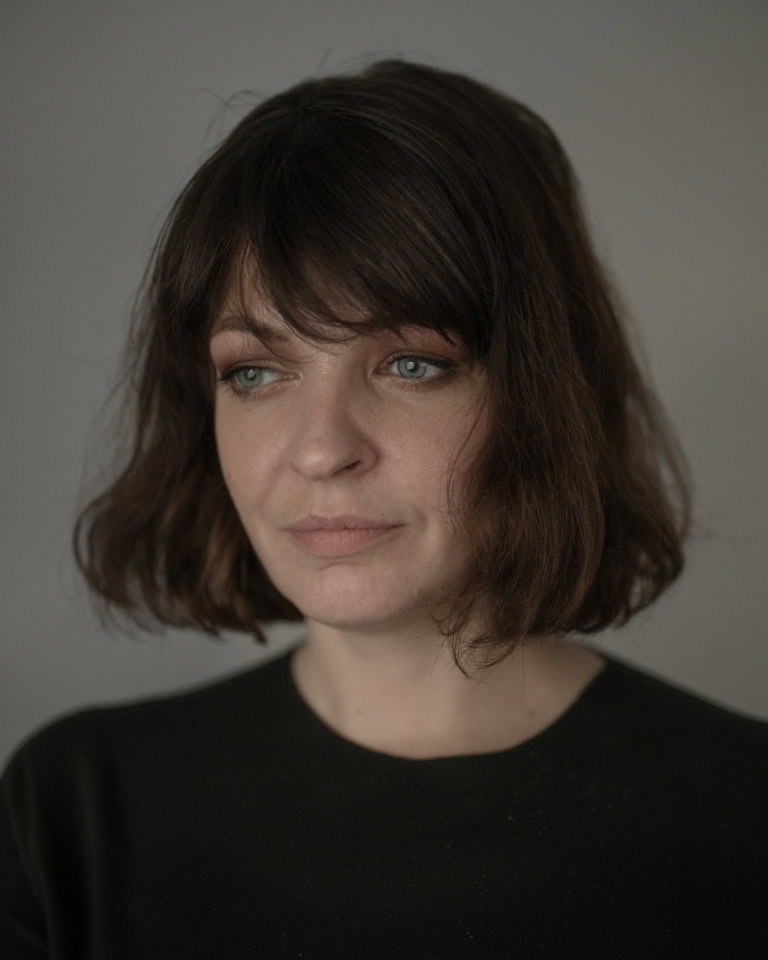 Portrait of Iryna Shchastnaya, a former political prisoner. Białystok, Poland. January 25, 2025.
Portrait of Iryna Shchastnaya, a former political prisoner. Białystok, Poland. January 25, 2025.
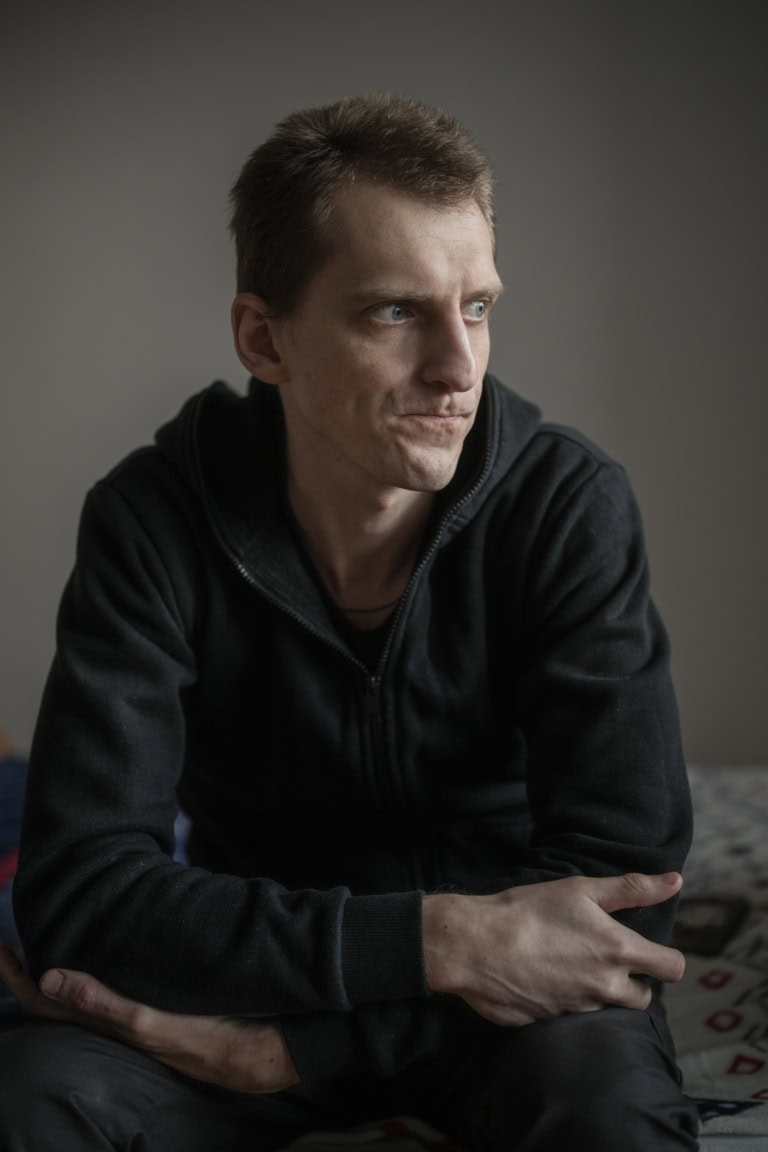 Portrait of Andrei, a former political prisoner. Warsaw, Poland. January 23, 2025.
Portrait of Andrei, a former political prisoner. Warsaw, Poland. January 23, 2025.
Etwa sechs Wochen später wurde ich für eine Residency für belarussische Fotograf*innen in Warschau angenommen und verließ mein Land. Seitdem lebe und arbeite ich im Ausland. Ich fotografiere weiter. Doch mein Fokus hat sich verschoben: Porträts von Menschen im Exil, Geschichten von unterbrochenen Leben. Die Distanz schmerzt. Ich habe das Gefühl, langsam den Kontakt zu verlieren. Die Verbindung bröckelt. Ich möchte zurück. Aber es ist unrealistisch.
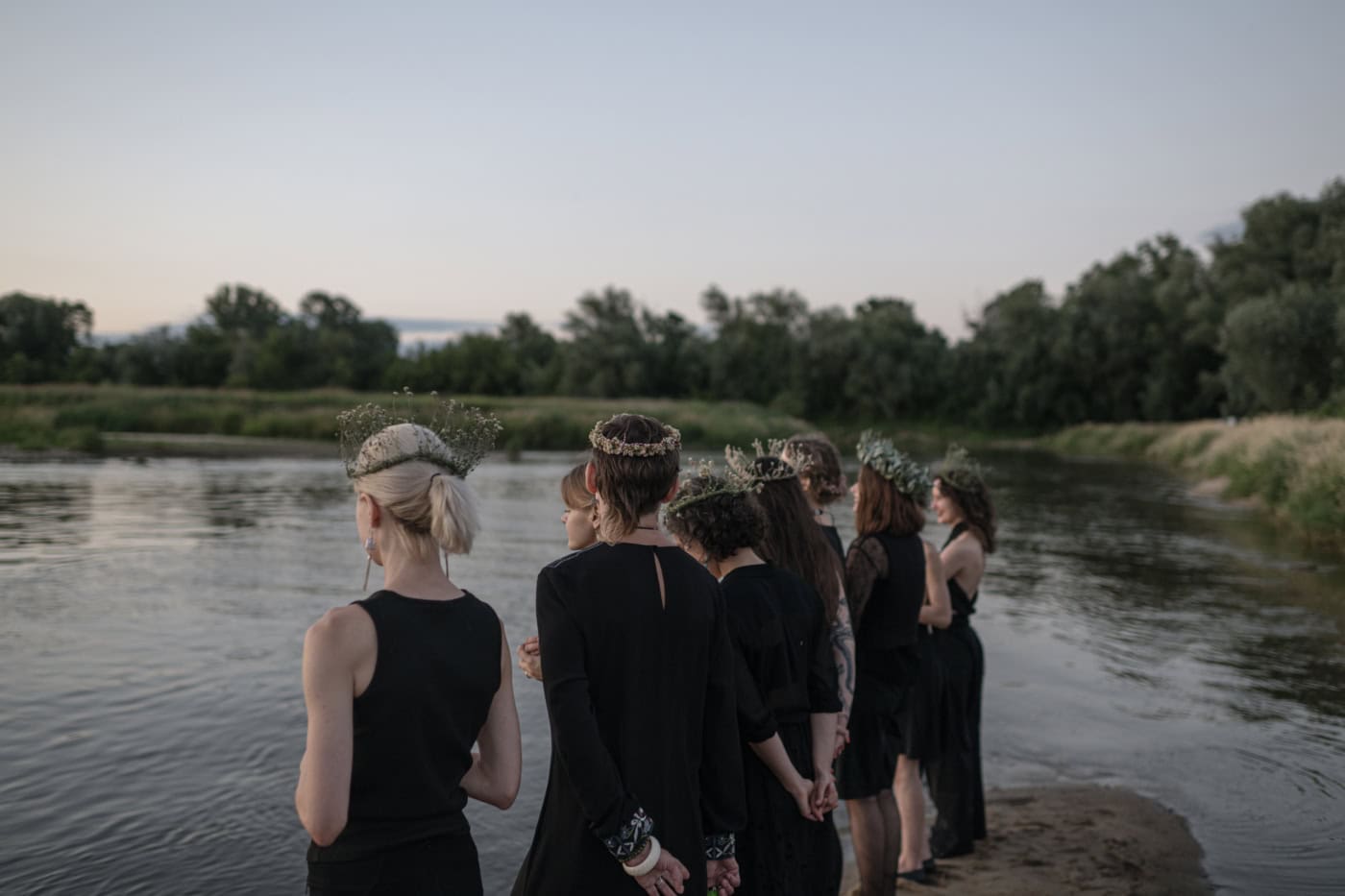 Women collective Spievy celebrating Midsummer day in Warsaw, Poland, on 22 June 2024.
The women of Spievy are deeply connected to the peaceful protests that began in Belarus on 12 August 2020. On that day, a group of women dressed in white gathered near Komarovka Market in Minsk, marking the beginning of a powerful and nonviolent demonstration against President Lukashenko's regime. The women, holding flowers and demanding fair elections, were met with police violence, but their actions sparked the wider protest movement that would sweep the nation. Many of the women who participated in these initial protests have become key figures in the Spievy collective, which celebrates Belarusian culture, identity, and the fight for freedom. Through their music and activism, they continue to honor the spirit of those early protests and keep the flame of resistance alive in exile.
Women collective Spievy celebrating Midsummer day in Warsaw, Poland, on 22 June 2024.
The women of Spievy are deeply connected to the peaceful protests that began in Belarus on 12 August 2020. On that day, a group of women dressed in white gathered near Komarovka Market in Minsk, marking the beginning of a powerful and nonviolent demonstration against President Lukashenko's regime. The women, holding flowers and demanding fair elections, were met with police violence, but their actions sparked the wider protest movement that would sweep the nation. Many of the women who participated in these initial protests have become key figures in the Spievy collective, which celebrates Belarusian culture, identity, and the fight for freedom. Through their music and activism, they continue to honor the spirit of those early protests and keep the flame of resistance alive in exile.
‹Map of Memories› (2020–laufend) ist mein
Langzeitprojekt – ein visuelles Archiv gegen das Vergessen.
In Belarus gilt Wahrheit als Feind des Regimes. Über 35.000 Menschen wurden im Zuge der Proteste festgenommen. Viele wurden gefoltert. Mehr als 400.000 Belaruss*innen haben seit 2020 das Land verlassen. Ende 2024 sitzen noch immer mindestens 1.265 politische Gefangene in Haft – darunter Oppositionsführerin Maryja Kalesnikawa und Friedensnobelpreisträger Ales Bjaljazki.
Im Exil begegnen uns andere Formen des Drucks: Distanz, Schuldgefühl, Ungewissheit. Einige kämpfen weiter, organisieren Proteste, unterstützen die Ukraine, setzen sich für politische Gefangene ein. Andere ziehen sich zurück, müde und erschöpft.
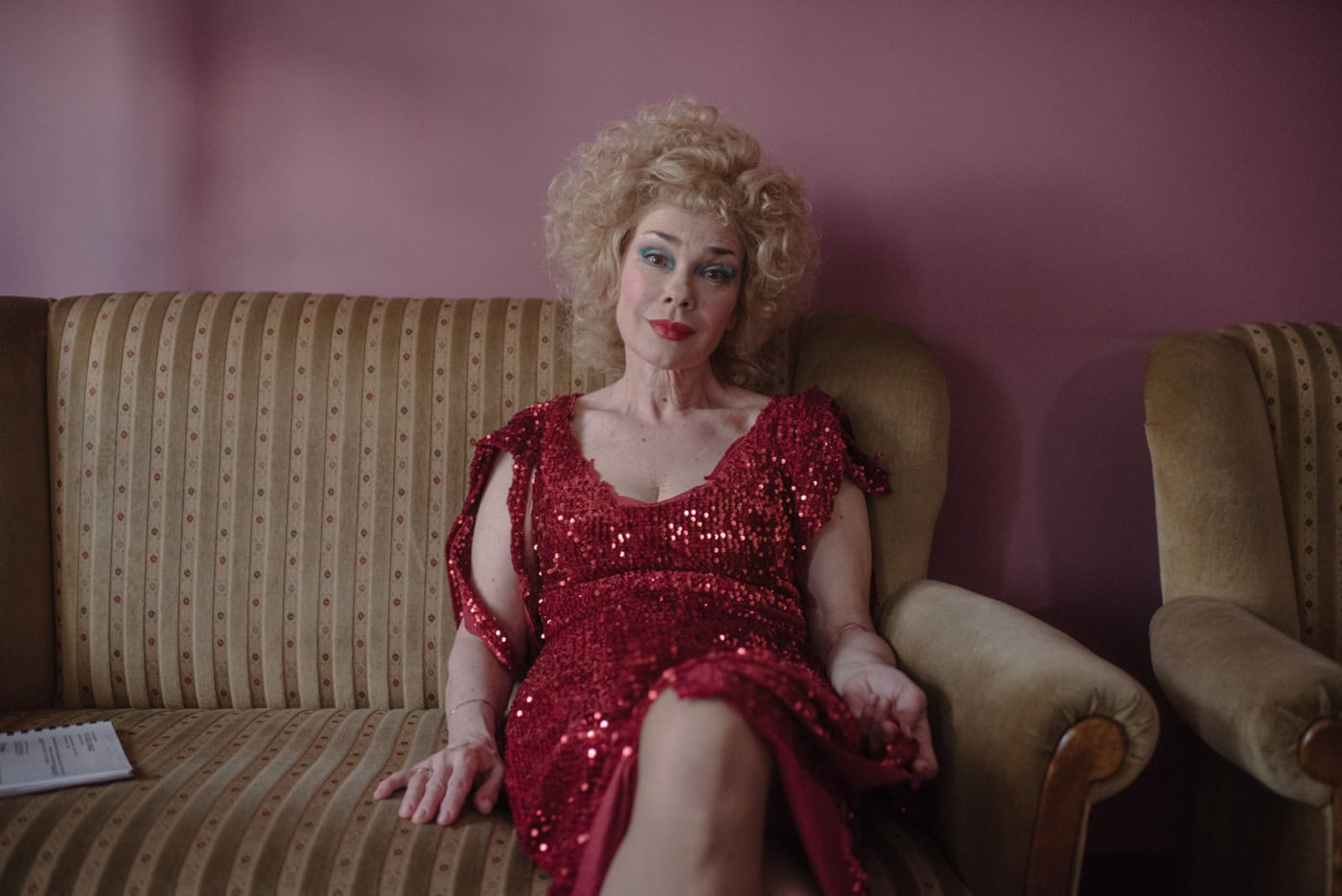 Zoya Belakhvostsik, an actress from the Kupala Theater, during the premiere of the performance "GESE-HUMANS-SWANS" based on Alherd Bakharevich's book "Dogs of Europe" in Lublin, Poland, on 17 June 2022.
In this performance, she portrays a typical representative of the authorities in Belarus, highlighting the tensions surrounding the political climate.
In August 2020, nearly 60 members of the Kupala Theater, including artistic director Nikolai Pinigin, resigned in protest against the dismissal of director Pavel Latushko. Since then, only 15 members of the original cast have remained. The theater has periodically held castings to replace members, mostly recruiting new actors from the Institute of Culture. Today, the Kupala Theater presents only five performances on its main stage.
Since the summer of 2020, over 800 figures from the Belarusian cultural scene have faced repression, with at least 98 individuals currently imprisoned, according to the Belarusian Rada of Culture.
Zoya Belakhvostsik, an actress from the Kupala Theater, during the premiere of the performance "GESE-HUMANS-SWANS" based on Alherd Bakharevich's book "Dogs of Europe" in Lublin, Poland, on 17 June 2022.
In this performance, she portrays a typical representative of the authorities in Belarus, highlighting the tensions surrounding the political climate.
In August 2020, nearly 60 members of the Kupala Theater, including artistic director Nikolai Pinigin, resigned in protest against the dismissal of director Pavel Latushko. Since then, only 15 members of the original cast have remained. The theater has periodically held castings to replace members, mostly recruiting new actors from the Institute of Culture. Today, the Kupala Theater presents only five performances on its main stage.
Since the summer of 2020, over 800 figures from the Belarusian cultural scene have faced repression, with at least 98 individuals currently imprisoned, according to the Belarusian Rada of Culture.
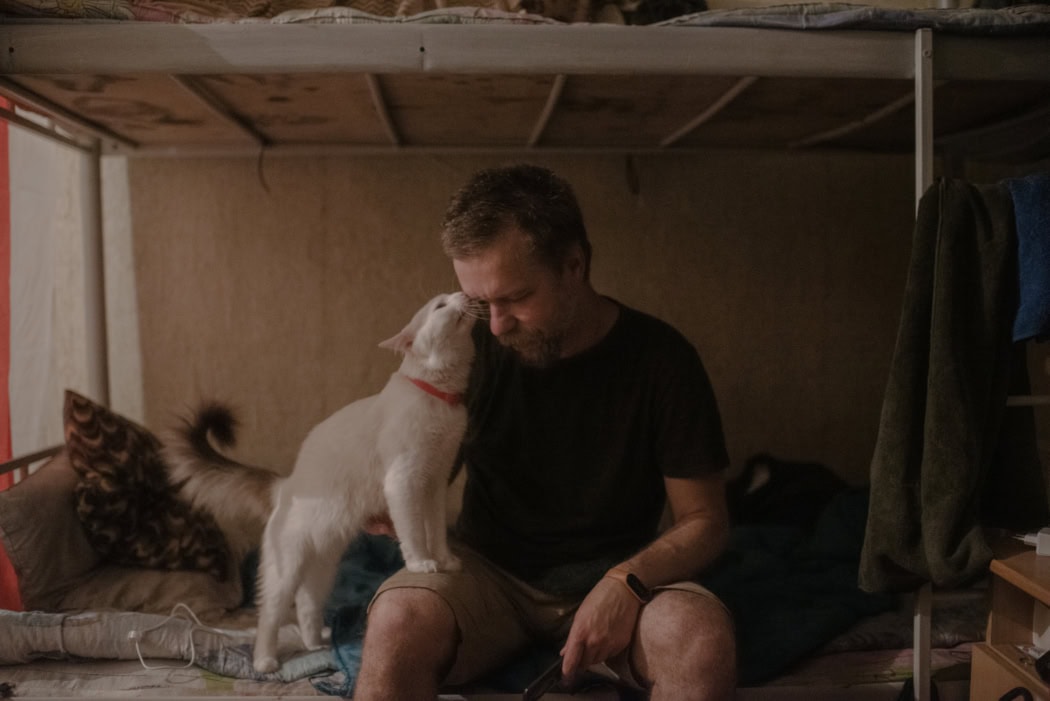 A fighter of the Kalinouski Regiment, nicknamed "Chili," and his cat at the regiment's base in Kyiv, Ukraine, on 2 August 2022.
"Chili" is a Belarusian who has been living in Ukraine for 15 years. When the war began, he and his wife were in Lviv. They decided to relocate to Kyiv and turned their apartment in Lviv into a temporary shelter for refugees, providing a safe haven for those fleeing the conflict.
The Kalinouski Regiment is one of the most prominent Belarusian volunteer formations fighting in Ukraine. Established in March 2022, it was named after Konstanty Kalinouski, a 19th-century Belarusian national hero who led an uprising against the Russian Empire. The regiment consists of Belarusians opposing the Lukashenko regime and Russian aggression, with many seeing the fight in Ukraine as directly tied to the struggle for Belarus’s freedom. Thousands of Belarusians have joined Ukraine’s Armed Forces, despite the risks of persecution or imprisonment if they return to Belarus.
A fighter of the Kalinouski Regiment, nicknamed "Chili," and his cat at the regiment's base in Kyiv, Ukraine, on 2 August 2022.
"Chili" is a Belarusian who has been living in Ukraine for 15 years. When the war began, he and his wife were in Lviv. They decided to relocate to Kyiv and turned their apartment in Lviv into a temporary shelter for refugees, providing a safe haven for those fleeing the conflict.
The Kalinouski Regiment is one of the most prominent Belarusian volunteer formations fighting in Ukraine. Established in March 2022, it was named after Konstanty Kalinouski, a 19th-century Belarusian national hero who led an uprising against the Russian Empire. The regiment consists of Belarusians opposing the Lukashenko regime and Russian aggression, with many seeing the fight in Ukraine as directly tied to the struggle for Belarus’s freedom. Thousands of Belarusians have joined Ukraine’s Armed Forces, despite the risks of persecution or imprisonment if they return to Belarus.
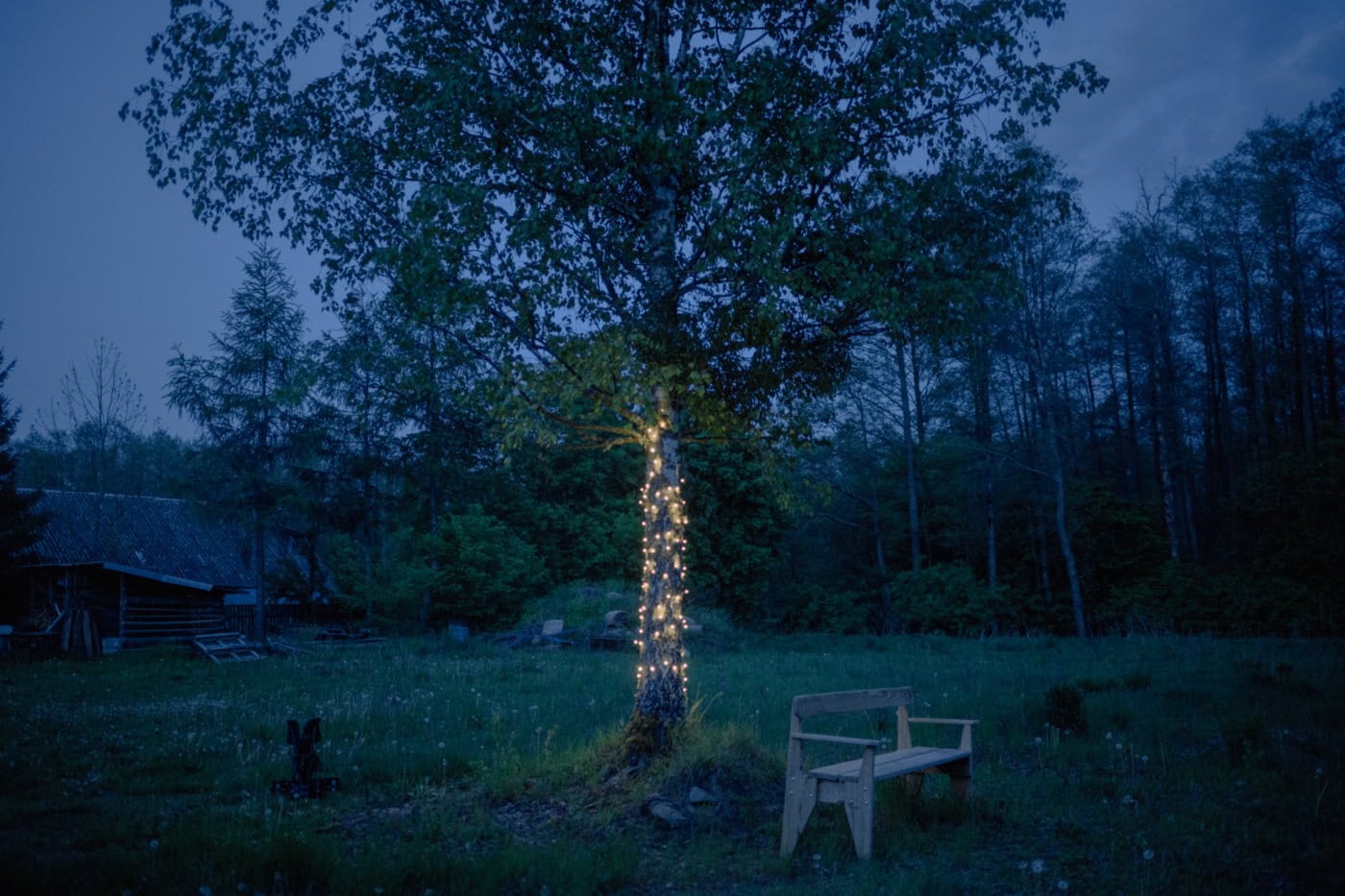 Courtyard of an agro-tourist estate in the village of Puchły, Poland, located just 34 kilometers from the Belarusian border, on 4 May 2024.
"Here I spent my first night on this trip, and this village reminded me of my childhood when I went with my parents to my father's village, Cielusza, to visit my grandparents and spent some time there in the summer or during holidays."
For many Belarusians in exile, places like Puchły offer a way to reconnect with their roots. Although they cannot return home due to political restrictions, they travel closer to the Belarusian border to experience the atmosphere and traditions that remind them of their homeland. Through culture—books, music, art, language, and even photographs—they recreate a version of Belarus outside its geographical borders, maintaining a bond with the country they can no longer visit. This sense of attachment keeps Belarus alive in their hearts, wherever they are.
Courtyard of an agro-tourist estate in the village of Puchły, Poland, located just 34 kilometers from the Belarusian border, on 4 May 2024.
"Here I spent my first night on this trip, and this village reminded me of my childhood when I went with my parents to my father's village, Cielusza, to visit my grandparents and spent some time there in the summer or during holidays."
For many Belarusians in exile, places like Puchły offer a way to reconnect with their roots. Although they cannot return home due to political restrictions, they travel closer to the Belarusian border to experience the atmosphere and traditions that remind them of their homeland. Through culture—books, music, art, language, and even photographs—they recreate a version of Belarus outside its geographical borders, maintaining a bond with the country they can no longer visit. This sense of attachment keeps Belarus alive in their hearts, wherever they are.
In Belarus selbst ist Unterdrückung längst Alltag. Wer bestimmte Farben trägt oder etwas Falsches postet, riskiert Festnahme. Die kommende Wahl 2025 verspricht keine echte Entscheidung, nur neue Angst. Und dennoch: Der Widerstand lebt. Leise. In Erinnerungen, im Schweigen, im Akt des Nicht-Vergessens.
Ich dokumentiere dieses Schweigen. Nicht nur als Fotograf, sondern als jemand, der selbst davon geformt wurde. Meine Bilder zeigen nicht nur andere. Sie erzählen auch meine Geschichte. Eine von vielen. Doch zusammen bilden diese Bruchstücke etwas, das schwerer zu löschen ist: ein Protokoll. Eine Verweigerung. Eine Erinnerungskarte, die kein Regime vollständig zerstören kann.
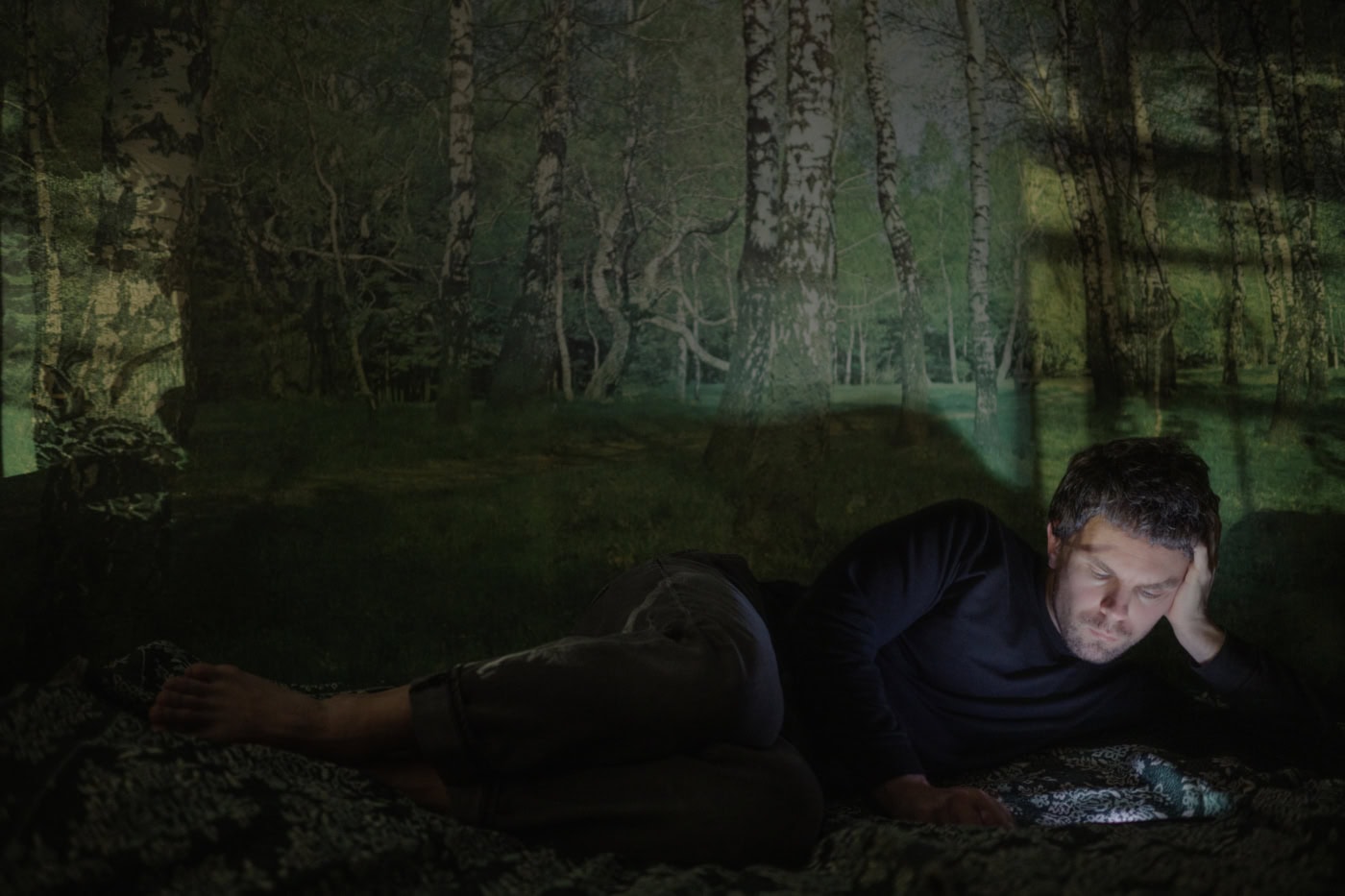 Self-portrait (Pasha Kritchko) in a rented room during one of his work trips to Podlasie. Hajnówka, Poland. December 23, 2024.
Self-portrait (Pasha Kritchko) in a rented room during one of his work trips to Podlasie. Hajnówka, Poland. December 23, 2024.

